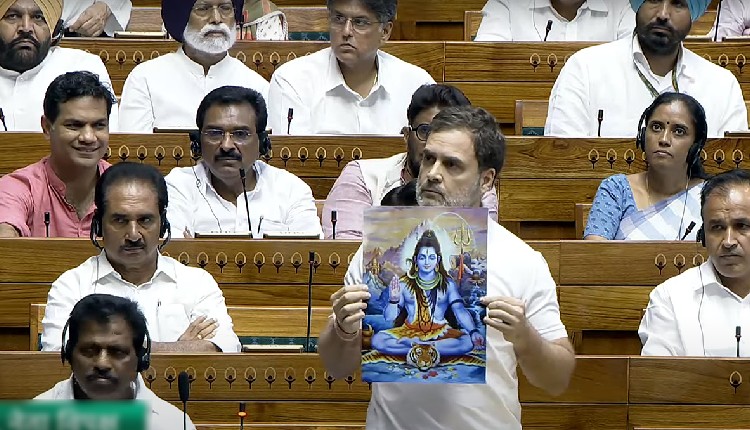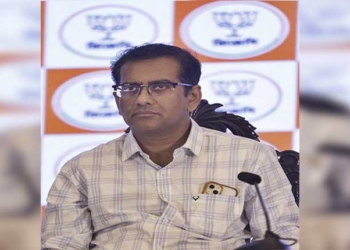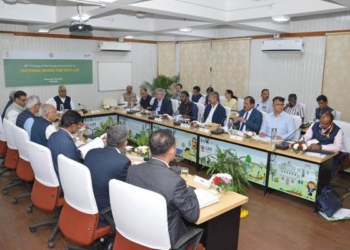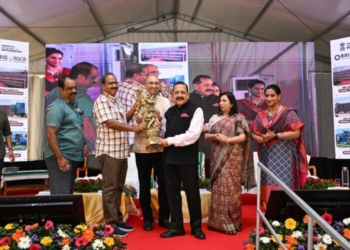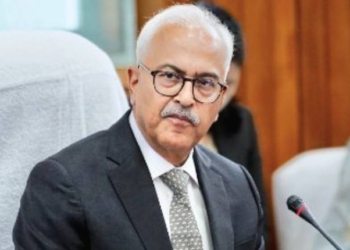New Delhi: When Rahul Gandhi rose to make his first speech as the Leader of Opposition in the Lok Sabha at 2 p.m. on Monday on the motion of thanks on President Droupadi Murmu’s address to the joint sitting of the Parliament, it was anticipated that the alleged NEET paper leak issue would find primacy in his address.
After all, Rahul Gandhi, his party Congress, and its allies have been raising this issue for over a fortnight now.
However, the Congress MP prioritised it differently as the issue figured for a few minutes in his speech at about 3.25 p.m., 85 minutes after he began speaking.
What ironically found focus in his speech was a philosophical narration of Lord Shiva’s sitting position, the ‘Abhay Mudra’, preaching of Islam, Christianity, Guru Nanak Dev, Lord Buddha, and Mahavir.
He also displayed a poster of Lord Shiva despite opposition from Speaker Om Birla.
The centrality of raising these points was Rahul Gandhi connecting them with his own position, which he claimed was the opposition’s stand — “don’t scare, don’t get scared”.
He spoke on these issues for about half an hour at the beginning of his speech and again referred to them towards the end of his address.
This, incidentally, became the most contentious part of his 110-minute speech, including interruptions and clarifications from the treasury benches.
Rahul Gandhi did arouse passion in the opposition benches, but his entire speech also gave the impression that he cares less, at times completely ignores facts, but goes on hammering the half-truths despite repeated clarifications and presentation of official facts from the government side.
His statement that those who call themselves ‘Hindu’ talk of violence and unleash violence came in for strong objection from no less than Prime Minister Narendra Modi.
The Prime Minister asked how could the Leader of Opposition paint the entire Hindu community as violence-prone, something that was beyond comprehension.
The Prime Minister later added that constitutionality and parliamentary practices have taught him that he should take the Leader of Opposition in all seriousness to stress the point that Rahul Gandhi was digressing from the established norms and practices.
The Congress leader found his defence in what RJD chief Lalu Yadav had said – that the BJP members were not Hindus, least of all protectors of Hinduism.
In fact, Home Minister Amit Shah rose twice to correct the facts and urge Speaker Om Birla to consider if parliamentary rules, norms, and practices had been given a waiver for a certain member of the House.
Amit Shah also said that Rahul Gandhi should speak to the SGPC and Islamic scholars on what they have to say about ‘Abhay Mudra’.
Rahul Gandhi, however, remained unfazed and continued without mending his ways.
His next flash point with the government was on the Agnipath scheme for the recruitment of Agniveers in the armed forces.
He claimed that Agniveers were “use and throw labourers” who were not given martyr status or compensation if they died in action during service.
Defence Minister Rajnath Singh countered him twice, saying if an Agniveer dies during action, the government gives a compensation of Rs 1 crore to his family.
But Rahul Gandhi chose not to correct himself, and instead called it Rajnath Singh’s ‘opinion’, adding that the Army and the Agniveers know the facts.
Home Minister Shah again had to intervene in the matter.
Similarly, Agriculture Minister Shivraj Singh Chouhan had to intervene to correct Rahul Gandhi when the latter said MSP was not being paid to the farmers, and during farmers’ agitation, the BJP called them terrorists.
The Congress MP later corrected himself by saying that he was talking about legal guarantees for farm produce.
It must be one of the rarest occasions in Indian parliamentary history when the Prime Minister, Home Minister, Defence Minister, and some other senior ministers had to intervene to object to and correct the Leader of Opposition, that too during his very first speech after assuming the post.
(IANS)




